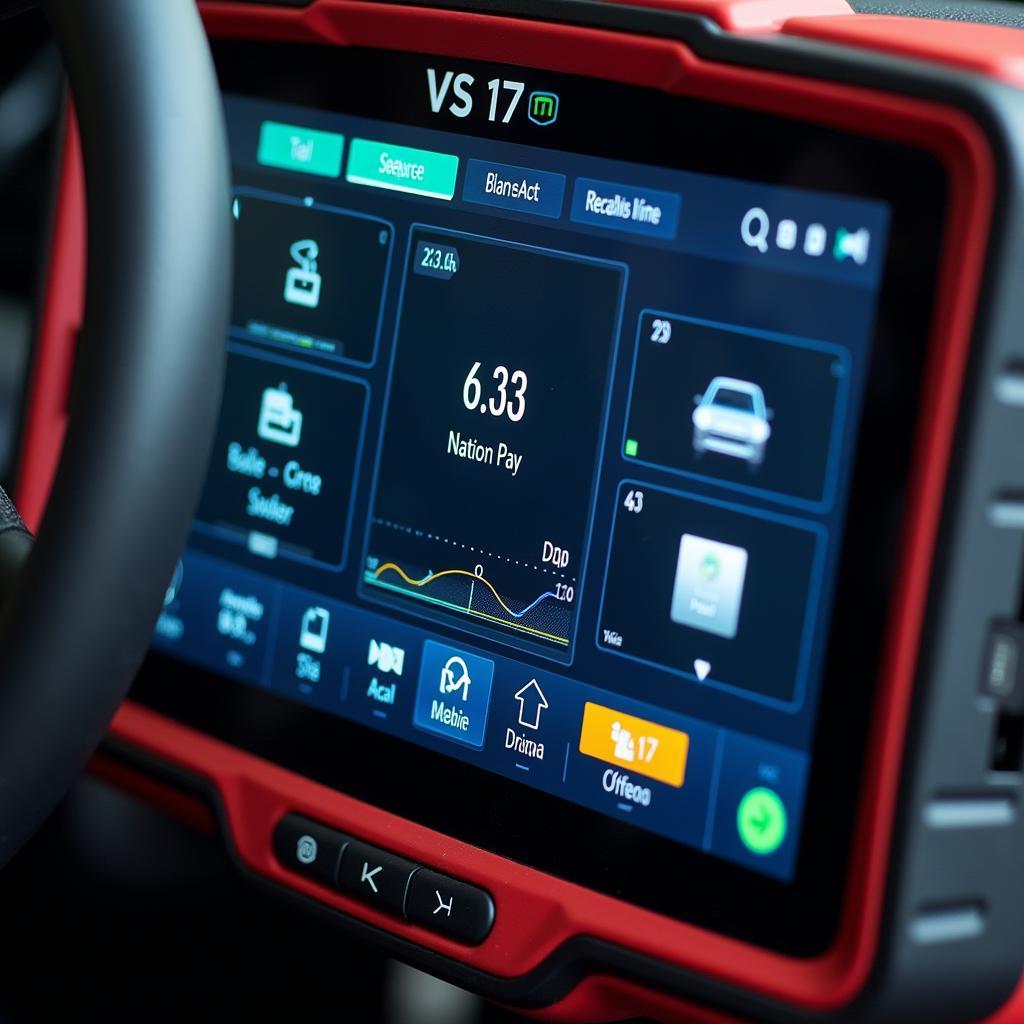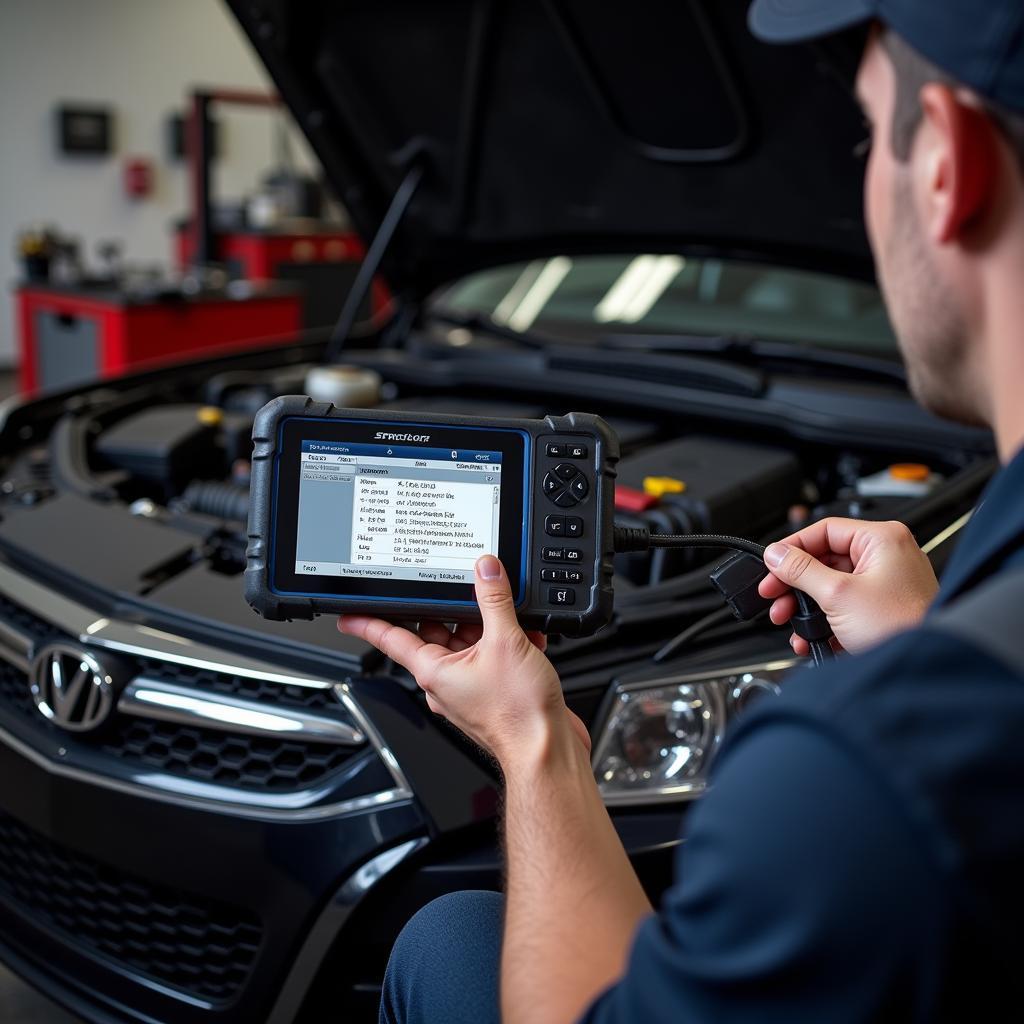A PTC diagnostic tool, also known as a Powertrain Control Module diagnostic tool, is an essential piece of equipment for anyone who owns, repairs, or maintains vehicles. These tools allow you to communicate with your car’s computer system, the PTC, to diagnose and troubleshoot issues related to the engine, transmission, and other powertrain components.
Understanding the Power of PTC Diagnostic Tools
[image-1|ptc-diagnostic-tool-in-action|Mechanic using a PTC diagnostic tool|A mechanic in a busy auto repair shop using a PTC diagnostic tool to diagnose a car’s engine problem. The tool is plugged into the car’s OBD-II port, and the mechanic is looking at the screen, which is displaying diagnostic trouble codes and live data.]
Imagine this: your check engine light pops on, and you have no idea why. Instead of a guessing game, a PTC diagnostic tool can provide you with specific diagnostic trouble codes (DTCs) that pinpoint the root of the problem. This saves you time, money, and unnecessary headaches by avoiding guesswork and replacing parts unnecessarily.
The Functionality of a PTC Diagnostic Tool
PTC diagnostic tools are available in various forms, from handheld devices to software programs that work with your computer or smartphone. Regardless of their form, they offer a range of functionalities, including:
- Reading and Clearing Diagnostic Trouble Codes (DTCs): This is the primary function of any PTC diagnostic tool. It allows you to read the DTCs stored in your vehicle’s computer, understand their meaning, and clear them once the issue is resolved.
- Displaying Live Data Stream: These tools provide real-time information from various sensors throughout your vehicle’s powertrain system. This data can include engine RPM, coolant temperature, oxygen sensor readings, and much more.
- Performing Actuator Tests: With a PTC diagnostic tool, you can command various actuators in your vehicle’s system, such as fuel injectors, solenoids, or even the starter motor. This helps determine if these components are functioning correctly.
- Supporting Advanced Functions: Some advanced PTC diagnostic tools offer functionalities like key programming, module coding, and adaptations. However, these functions require a deeper understanding of your vehicle’s systems and should be performed with caution.
Who Benefits from PTC Diagnostic Tools?
PTC diagnostic tools are valuable for a wide range of users:
- Car Owners: For the DIY enthusiast, a basic PTC scanner can empower you to understand and address minor car problems, saving on costly mechanic visits.
- Mechanics and Technicians: In a professional setting, PTC diagnostic tools are indispensable for quickly diagnosing and repairing vehicles. They streamline the diagnostic process and allow technicians to address issues efficiently.
- Fleet Managers: Managing a fleet of vehicles necessitates keeping track of their health and maintenance. PTC diagnostic tools help fleet managers monitor vehicle performance, anticipate potential issues, and schedule timely maintenance.
[image-2|different-types-of-ptc-diagnostic-tools|Various PTC Diagnostic Tools|A collection of different types of PTC diagnostic tools, showcasing the variety available in the market. This includes handheld scanners, OBD-II dongles that connect to smartphones, and more professional-grade diagnostic tablets.]
Choosing the Right PTC Diagnostic Tool
With numerous options available, selecting the right PTC diagnostic tool depends on your specific needs and budget.
Factors to Consider:
- Vehicle Compatibility: Ensure the tool is compatible with your vehicle’s make, model, and year.
- Functionality: Determine the features that are essential for your needs.
- User Friendliness: Opt for a tool with an intuitive interface and easy-to-understand data presentation.
- Budget: Prices vary significantly based on functionality and features.
“Investing in a reliable PTC diagnostic tool is a wise decision for any car owner or mechanic. It empowers you with the knowledge to understand your vehicle’s health, diagnose problems accurately, and make informed repair decisions.” – John Smith, Senior Automotive Engineer
Conclusion
A PTC diagnostic tool is no longer a luxury but a necessity in the world of modern vehicles. It arms you with the ability to understand your car’s inner workings and tackle issues head-on. Whether you’re a car enthusiast looking to demystify the check engine light or a seasoned mechanic striving for efficiency, a PTC diagnostic tool is an investment worth considering.
Need help finding the right PTC diagnostic tool? Contact ScanToolUS at +1 (641) 206-8880 or visit our office at 1615 S Laramie Ave, Cicero, IL 60804, USA. Our team of experts can guide you towards the perfect tool for your needs.
FAQs
1. Will a PTC diagnostic tool work on all car brands?
While most modern vehicles use standardized OBD-II ports, compatibility may vary. Always check the tool’s specifications to ensure it supports your vehicle.
2. Can I use a PTC diagnostic tool to reset my car’s oil light?
Yes, many PTC diagnostic tools allow you to reset maintenance reminders, including oil life monitors.
3. Are PTC diagnostic tools difficult to use?
Many entry-level scanners are user-friendly, providing clear instructions and easy-to-interpret data.
4. Can I use a PTC diagnostic tool to program a new key for my car?
Some advanced tools offer key programming functionalities. However, it’s crucial to consult your vehicle’s manual or a professional for such tasks.
5. What is the difference between a code reader and a scan tool?
Code readers simply read and clear DTCs, while scan tools offer more advanced features like live data streaming and actuator tests.



